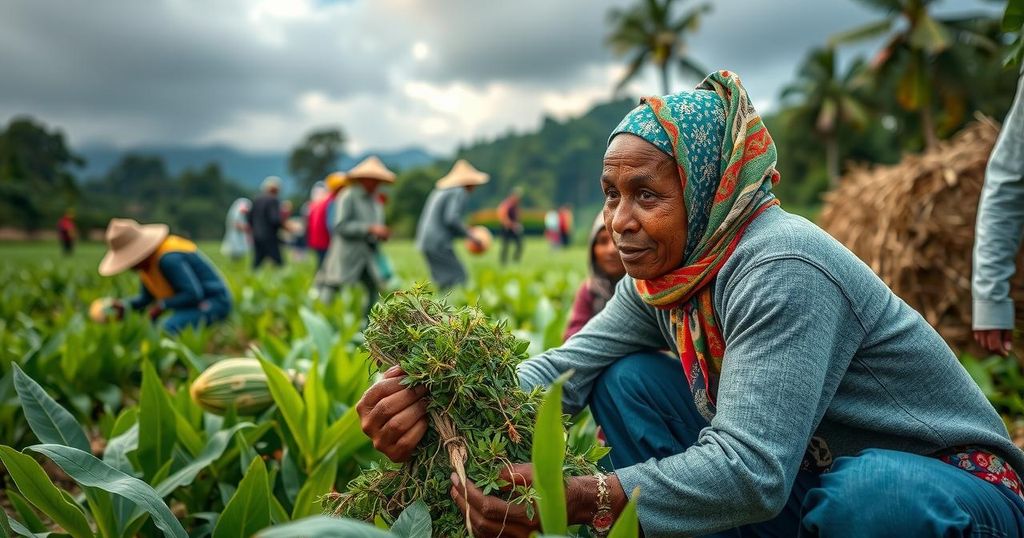Fairtrade Producers Implement Climate Change Adaptation Plans for Resilience
Research from Fairtrade International reveals that a growing number of Fairtrade producer organisations are developing climate change adaptation plans, primarily in coffee sectors, but increasingly in cocoa, tea, banana, and sugar. By the end of 2022, about 502 organisations had developed plans, with 96% implementing measures aimed at enhancing production resilience against climate change impacts. Key successful strategies include planting disease-resistant varieties and improving soil health, supported by ongoing training and financial investment.
Growing concerns regarding climate change have prompted Fairtrade producer organisations to implement climate change adaptation plans (CCAPs). Research from Fairtrade International indicates that such measures are particularly prevalent among coffee producers, with emerging examples in cocoa, tea, banana, and sugar sectors. By the conclusion of 2022, 502 producer organisations, constituting approximately 25% of all Fairtrade certified entities, had devised these adaptation strategies. Notably, 96% of those organisations had initiated the implementation of these plans, which encompass a variety of strategies aimed at enhancing resilience against adverse climate effects. An in-depth analysis revealed that a significant number of the plans maintained a good to moderate quality, although some exhibited deficiencies in contextual data and connections to specific climate threats. The research furthered its examination through an online survey targeting Fairtrade organisations in Africa and Latin America that had put CCAPs in place. Responses from 37 organisations provided insights into the development process, emphasizing its role in cultivating farmer knowledge and facilitating initial adaptive actions geared towards bolstering productivity. Key measures adopted included the cultivation of disease-resistant crops, improved soil management practices, and enhanced irrigation. These strategies have been corroborated through existing literature as effective in reinforcing agricultural resilience. The study highlights that dedicated training, awareness initiatives regarding climate change, access to technical resources, and opportunities for financial investment are crucial factors for effective implementation. Following the execution of climate adaptation strategies, organisations observed substantial improvements, including better soil quality, reduced reliance on chemical fertilizers, and increased crop resilience. The research team recommends augmenting data collection and monitoring processes to systematically evaluate these adaptation efforts, advocating for the establishment of comprehensive data systems within producer organisations. Moreover, the existing adaptation measures appear to address only modest climatic impacts. The researchers caution that future climate scenarios demand broader, more radical changes to production systems, necessitating collaborative efforts among producer organisations and supportive institutions. Long-term success in climate adaptation will hinge on sustained training, expert guidance, and financial resources to enable investments in transformative technologies and infrastructure. Given these findings, it is clear that proactive measures taken by Fairtrade producers are vital in navigating the challenges posed by climate change. Continuous evolution of these strategies will be essential as environmental conditions deteriorate, underscoring the importance of collective action and innovation within the agricultural sector.
Climate change poses a significant threat to global agriculture, with various crops experiencing increased temperatures, pests, and water scarcity. Fairtrade organisations have recognized the urgency of these challenges and initiated climate change adaptation plans to enhance agricultural resilience. These strategies aim to equip farmers with the tools necessary to adapt effectively to changing environmental conditions. Research conducted by Fairtrade International highlights the importance of CCAPs in bolstering production stability and sustainability within the Fairtrade system.
In conclusion, Fairtrade producer organisations are making strides in adapting to climate change through the implementation of climate change adaptation plans. The research underscores the importance of these plans in enhancing resilience among farmers, particularly through knowledge enhancement, effective agricultural practices, and improved crop management strategies. Continued support in training, financial resources, and collaborative efforts will be critical in addressing the evolving challenges posed by climate change, ensuring the sustainability of agricultural production across various sectors.
Original Source: www.fruitnet.com




Post Comment